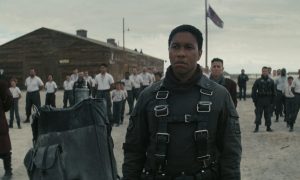The next game in the Total War series is coming out in Spring 2019, so I got a chance to sit down with Al Bickham and Pawel Wojs to discuss why they chose the Three Kingdoms period, what we can expect from this next installment, and what they’re excited for players to experience when the game comes out.
For the latest Total War game, what made you guys want to focus on the Three Kingdoms specifically, based on your track record so far?
Al: So, A: it’s a period we’ve never tackled, which makes it interesting for our players, um, and our players have been asking us for years, “you guys should go and do the Three Kingdoms.” For that reason, it makes it an interesting period to tackle. I think more, well also, it’s the perfect period for a Total War game— it fits the Total War DNA. It’s a period of civil war, uprising, unification, and tons of different characters in factions, all vying for the, uh, to essentially become the ruler of China. So it’s perfect for a Total War game in that respect because you have all the ingredients. I guess the overriding thing is that it’s a fascinating period full of, uh, full of drama, backstabbing, great alliances, and incredible characters that drove the events of the period, which has actually inspired how we’ve gone about making this particular Total War game in a way we haven’t done before. It’s actually all about the characters, isn’t it?
Pawel: Yeah, and the really interesting thing about this period is that it has two… two primary sources of reference. We have the records, which is the historical text from the, uh, you know, the period, and about 100 years after the period, which is a detailed account of the Three Kingdoms and the years before it. And then we got the Romance of the Three Kingdoms, which is the romanticized version of those events that gives us a, uh, really unique detailed layer that we don’t normally have when we approach a historical game. You know we do historical research, we look at historical texts, but we never have this sort of detailed account of relationships, personalities, and a very personal kind of focus, which is why, for us, it was so important to build that into the game, and why the game is such a character-centric game. It’s all about these characters and their relationships, and it’s such an important thing, for the Chinese people there is no separation between record and romance, it’s all one thing. Three Kingdoms, this is it, and that’s how it happened.
Al: That’s our history.
Pawel: Yeah, that’s our history, and we had to do that.

So before you were saying how characters are much more important in terms of development and everything. I noticed the term for it was “guanxi,” and that it affected the game rather than just being a storytelling mechanic. How does that affect the gameplay for players?
Pawel: So, it’s everything right? It’s a, it’s a term that basically, it’s a catch-all of the relationships that characters have: their desires, their wants, their family ties, their fealty, the blood-bonds, the uh, it’s all of these relationships.
Al: Their honor, reciprocity between people, you know, and it’s still a relevant, um, sort of philosophy in Chinese culture today, and um, the way we realized that is— on a more technical level at least— by giving our characters more dimensions, more sort of facets, than they’ve ever had in Total War games before. So take a previous Total War game, like Rome II, where you’ve got a Roman general, and you send him out to fight, and he periodically levels up and gets some sort of skill points to spend, so you make him a better general, you make him a better personal warrior; so when he’s actually on the battlefield, he’s winning more battles or skirmishes that way. In essence, your characters are little, sort of, pots that you pour your points into so you can make them better at specific things. They’re little tools that you craft into doing specific things very well, whereas this time around we wanted to build personality into characters, we wanted to build characters with a sense of agency of their own. Alright, so now characters in Total War: Three Kingdoms, our characters have, at a base level they have personality which you discover over time, and that is predestined. You don’t really have a say over what that personality is, and that means that they have, along with that personality, they have a satisfaction level with their place in the world. You could recruit characters into your faction, and um, you find out, because you’re in the middle of a war with two other factions, constantly sending your troops out to fight, that your satisfaction level might start dropping immediately because he doesn’t like being at war. What he wants to do is be in a nice, diplomatic faction that builds through peaceful means. So after a while, you, you get this, and go “ah okay, so that’s kinda how you work.” There’s ways and means to kinda improve character happiness; if their happiness drops, their loyalty to you as a faction leader may drop as well, to a point where they might decide to leave. Like, “this place isn’t for me, you guys do your thing. I’ll go join those guys because they’re much more diplomatic.” So you’ve got characters with their own motivations and drives, which is something we’ve never had before. Characters can also build relationships with other characters; so if you got two nobles in your core that are very like-minded, they may form a bond, a bond of brotherhood between them. So they’ll, the friendship rating between them will rise, and then you’ve got two characters whose personal loyalties might outweigh other loyalties in the world. So, um, if one of those characters is not useful for you, or is a thorn in your side in some way, and you decide to dismiss him from your faction, there’s a possibility that his friend might go with him, because blood is thicker than water and all that. So yeah, characters work very differently now; they’re not just tools, they’re not just there to help you win the game in different and better ways.
Pawel: And that’s how they impact the story, by these relationships, they change. Everytime you play there’s different ways that these things play out depending on the characters you have and the interactions that they have. The fact that these characters can move around, uh, faction to faction, very much changes the kind of experience. You’ll know characters, you’ll see where they’ve been or where they’re going, and that very much changes the way the game feels and the way it plays out. Not only that, because of this belief that these characters, that their fates were predetermined by heaven, um, you have these personalities, these famous personalities that if you’re a fan of the period in the book or movies or TV series, you’ll recognize the characters that you love and know, and they will be what you expect them to be.
Al: They’ll have those traits.
Pawel: Exactly. It’s not just the characters in name only, it’s them in name, personality, and everything.
Al: What was the example you used earlier? There was, in a previous Total War game, characters would gain traits as a result of actions. So in Rome II, you could take Caesar, and just sit him in a settlement, not take him out to war, not do anything with him, and just leave him for 50 turns in a settlement, and he might get the lazy trait.
Pawel: Or maybe drunkard, like lazy drunkard.
Al: Like Caesar was anything but a lazy drunkard alright, so, so that’s not gonna happen with these guys. They’re gonna-
Pawel: If a character is known to be a lazy drunkard, they’ll be a lazy-
Al: They’ll definitely be a lazy drunkard.
Pawel: He won’t be any different because his heaven has determined that that’s his path.
So that way you’re not dramatically changing the character.
Al: Exactly.
Pawel: There would be riots in China if we did that. These characters are so, that’s another facet of this project, this game where these characters are so known to anybody that’s familiar with the book, um, and even us after reading the books several times, you become intimately attached to these characters. And even in the office, sometimes we have arguments when something happens; like we get angry, saying this cannot happen.
Al: Liu Bei would not do that.
Pawel: He would never do this. This can’t happen, we need to change that because that’s just ridiculous right? You become very attached to these personalities.
I understand, like in one of my plays where Lady Sun’s brother died in battle, she lost it and booked it straight at the nearest enemy. I tried to pull her away so she didn’t get herself killed, but she wouldn’t listen.
Al: Yeah, yeah, they go berserk. That’s the family connection there, that’s having that close bond.
I was having her run away, but she turned right back around.
Pawel: Yeah, and it doesn’t have to be a family connection, it could be a brotherly bond, like a blood-brotherhood, and it’s uh, it’s powerful stuff.

You guys also put the dueling aspect in there. Is there any special reason you wanted to add that into this version?
Pawel: Of course, because again, it’s one of those things where you can’t tell the story of the Three Kingdoms without having that.
Al: The personal combat.
Pawel: So many, all of these warriors settle their conflicts with combat, with dueling. It was very much a thing that happened; you got your troops fighting, but battles were decided by the main vanguards, the heroes just uh, just dueling. Because most of the standard troops couldn’t stand up to these characters, they never would, so commanders would have to bring out their own champions to fight against the enemy. It was always resolved with duels.
I liked the way the dueling worked where you could have it happen, and you could stop it, but it would drop morale.
Pawel: Massive honor hit, so dishonorable for them.
It’s so realistic, like you can’t just say “nevermind, I don’t want to,” or else the troops will be like, “if our leader can’t win, how can we stand a chance?”
Pawel: Right, then all the troops lose face. Same thing happens if you interrupt right? If you decide to have your troops fire on the opponent in the duel, you’ll again lose, you’ll get massive penalties.

Are there any other final words for fans of the Total War series?
Al and Pawel: SPIES!
Pawel: So we’ve covered characters right? We’ve talked about characters moving around right? A character can leave a faction is he’s disgruntled or if you want to let him go. If a character is willing to spy for you, you can cast him out into the world, and he might be hired by an opponent, an opposing faction.
Al: (whispers) But he’s still working for you.
Pawel: Since he’s still working for you, you straight away get a vision of what they’re doing. These aren’t agents, they aren’t these little pawns, they’re still the same characters; so if it’s a general, a hero that you know, you’ll see him on the battlefield or campaign map doing whatever his faction leader tells him to do, but he is still your spy. The longer, the more time he spends, the larger network that he builds will enable him to do more, and perform more and more actions. If he’s a governor, over time he might be able to turn over that province to you. If he’s a general, he might take an army and let you take it over so it’s your army. If he’s in a faction long enough, he could earn the trust of that faction leader and potentially be adopted as that faction heir. In which case, if anything should happen to that faction leader, he is, your spy, is now the leader of that faction, and straight away you could trigger a civil war to take control of as much of that faction as possible. Um, and obviously all of this is also in multiplayer. So in multiplayer, all of the paranoia of the spies-
Al: Oh, and they can get busted as well. It’s a risk, with every time they do a spy action there’s a risk. Um, the longer they build up a network and they longer they stay in and don’t do anything, their cover improves. When they do actions is when they’re likely to become revealed. If they do get revealed, the faction leader goes “oh, we have a spy in our midst,” and they have a choice. They could execute them, they could kick them out, or if they’re able to do so, they can say “hey, I’ll let you live if you go back to your original faction and you become my spy.” See, they can turn them and make them a double agent.
Pawel: As long as that spy is willing, right? That spy’s loyalty to his original faction leader may be so strong that he says no and then he’ll be executed. But if they’re willing, they could go back as a double agent.
Al: So if you send a spy over and his loyalty isn’t that high, and he comes back, you might be like, “oh, I got my best guy back,” but he might be turned.
So you won’t know if he’s secretly stabbing you in the back once he’s returned.
Pawel: Exactly, exactly.
Al: There’s a whole level of subterfuge and intrigue that we’ve never had in a game before.
That seems like it’s going to add a whole other layer of things to consider while playing.
Al: Yep, that’s what we’re hoping for.
Total War: Three Kingdoms will launch in Spring 2019, so make sure to check out our hands-on preview of the game to get a better look at what you can expect from the next installment in the Total War series.
Codi loves to play video games and watch movies. He will watch almost any kind of movie just to experience them. His ideas take inspiration from the shows and movies he watches, and games he plays. He also loves a good pun.


 Buy Now
Buy Now
 Buy Now
Buy Now
 Buy Now
Buy Now
 Buy Now
Buy Now
 Buy Now
Buy Now
 Buy Now
Buy Now















